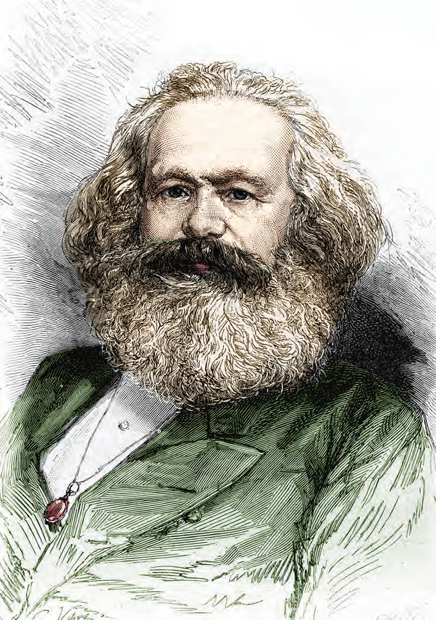

MARX

Peter Singer


New York / London
www.sterlingpublishing.com
STERLING and the distinctive Sterling logo are registered trademarks of Sterling Publishing Co., Inc.
Library of Congress Cataloging-in-Publication Data
Singer, Peter, 1946
Marx: a very short introduction / Peter Singer.
p. cm. -- (Brief insights)
ISBN 978-1-4027-6888-0
1. Marx, Karl, 1818-1883. 2. Communists--Biography. 3. Communism--History. 4. Marxian economics. 5. Philosophy, Marxist. I. Title.
HX39.5.S533 2009
335.4092--dc22
2009025879
10 9 8 7 6 5 4 3 2 1
Published by Sterling Publishing Co., Inc.
387 Park Avenue South, New York, NY 10016
Published by arrangement with Oxford University Press, Inc.
1980 by Peter Singer
Illustrate edition published in 2010 by Sterling Publishing Co., Inc.
Additional text 2010 Sterling Publishing Co., Inc.
Distributed in Canada by Sterling Publishing
c/o Canadian Manda Group, 165 Dufferin Street
Toronto, Ontario, Canada M6K 3H6
Book design: The DesignWorks Group
Please see picture credits on page 149 for image copyright information.
Printed in China
All rights reserved
Sterling ISBN 978-1-4027-6888-0
For information about custom editions, special sales, premium and corporate purchases, please contact Sterling Special Sales Department at 800-805-5489 or .
Frontispiece: This undated photograph of Karl Marx (1818-83) appears to have been taken some time in the 1870s.
CONTENTS
THERE ARE MANY BOOKS ON MARX , but a good brief introduction to his thought is still hard to find. Marx wrote at such enormous length, on so many different subjects, that it is not easy to see his ideas as a whole. I believe that there is a central idea, a vision of the world, which unifies all of Marxs thought and explains what would otherwise be puzzling features of it. In this book I try to say, in terms comprehensible to those with little or no previous knowledge of Marxs writings, what this central vision is. If I have succeeded, I need no further excuse for having added yet another book to the already abundant literature on Marx and Marxism.
For biographical details of Marxs life, I am especially indebted to David McLellans fine work, Karl Marx: His Life and Thought (Macmillan, London, 1973). My view of Marxs conception of history was affected by G. A. Cohens Karl Marxs Theory of History: A Defense (Oxford University Press, Oxford, 1979), although I do not accept all the conclusions of that challenging study. Gerald Cohen sent me detailed comments on the draft of this book, enabling me to correct several errors. Robert Heilbroner, Renata Singer, and Marilyn Weltz also made helpful comments on the draft, for which I am grateful.
In the interest of clear prose I have occasionally made minor amendments to the translations of Marxs works from which I have quoted.
Finally, were it not for an invitation to take part in this series from Keith Thomas, the general editor of the series, and Henry Hardy, of Oxford University Press, I would never have attempted to write this book; and were it not for a period of leave granted me by Monash University, I would never have written it.
Peter Singer
REFERENCES IN THE TEXT TO MARXS writings are generally given by an abbreviation of the title, followed by a page reference. Unless otherwise indicated below, these page references are to David McLellan (ed.), Karl Marx: Selected Writings (Oxford University Press, Oxford, 1977).
| B | On Bakunins Statism and Anarchy |
| C I | Capital, Volume I (Foreign Languages Publishing House, Moscow, 1961) |
| C III | Capital, Volume III |
| CM | Communist Manifesto |
| D | Doctoral thesis |
| EB | The Eighteenth Brumaire of Louis Bonaparte |
| EPM | Economic and Philosophical Manuscripts of 1844 |
| G | Grundrisse (translated M. Nicolaus, Penguin, Harmondsworth, 1973) |
| GI | The German Ideology |
| GP | Critique of the Gotha Program |
| HF | The Holy Family |
| I | Toward a Critique of Hegels Philosophy of Right: Introduction |
| J | On the Jewish Question |
| M | On James Mill (notebook) |
| MC | Letters and miscellaneous writings cited in David McLellan, Karl Marx: His Life and Thought (Macmillan, London, 1973) |
| P | Preface to A Contribution to the Critique of Political Economy |
| PP | The Poverty of Philosophy |
| R | Correspondence with Ruge of 1843 |
| T | Theses on Feuerbach |
| WLC | Wage Labor and Capital |
| WPP | Wages, Price, and Profit (in K. Marx, F. Engels, Selected Works, Foreign Languages Publishing House, Moscow, 1951) |

This engraving, created by Charles Baude around 1883, is based upon a painting of Marx by Gaston Vuillier.
MARXS IMPACT CAN ONLY BE COMPARED with that of religious figures like Jesus or Muhammad. For much of the second half of the twentieth century, nearly four of every ten people on earth lived under governments that considered themselves Marxist and claimedhowever implausiblyto use Marxist principles to decide how the nation should be run. In these countries Marx was a kind of secular Jesus; his writings were the ultimate source of truth and authority; his image was everywhere reverently displayed. The lives of hundreds of millions of people have been deeply affected by Marxs legacy.
Nor has Marxs influence been limited to communist societies. Conservative governments have ushered in social reforms to cut the ground from under revolutionary Marxist opposition movements. Conservatives have also reacted in less benign ways: Mussolini and Hitler were helped to power by conservatives who saw their rabid nationalism as the answer to the Marxist threat. And even when there was no threat of an internal revolution, the existence of a foreign Marxist enemy served to justify governments in increasing arms spending and restricting individual rights in the name of national security.

Next page
























